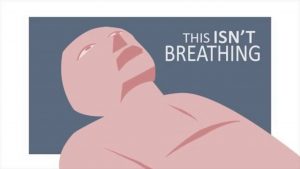What You Should Know About Agonal Breathing
Agonal breathing is the medical term for the gasping that people do when they’re struggling to breathe because of cardiac arrest or other serious medical emergencies. The desperate gasping for air is usually a symptom of the heart no longer circulating oxygenated blood, or there is an interruption of lung activity that is reducing oxygen intake. It can often signal that death is imminent.
If you see someone struggling to breathe, call your local emergency medical services immediately on 000.
SYMPTOMS
 Agonal breathing is not the same as a “death rattle,” which is the gurgling noise that some people make when they’re dying. Death rattle is caused by saliva or mucus collecting in the throat or chest. Agonal breathing, or agonal respiration, is instead an abnormal and often brief pattern of breathing.
Agonal breathing is not the same as a “death rattle,” which is the gurgling noise that some people make when they’re dying. Death rattle is caused by saliva or mucus collecting in the throat or chest. Agonal breathing, or agonal respiration, is instead an abnormal and often brief pattern of breathing.
Agonal breathing may sound like gasping, but it can also sound like snorting and laboured breathing. It may even seem as though the person is moaning. The abnormal breathing may last only a few breaths or could go on for hours. The cause of agonal breathing will affect how long it goes on and whether there are other symptoms.
Agonal breathing may occur with cardiac arrest or a stroke. So it’s possible the person may lose consciousness while gasping. Stroke symptoms include:
- weakness on one side of the body
- lack of coordination
- poor speech or an inability to understand speech
- a sudden headache
CAUSES
Agonal breathing can occur when someone has gone into cardiac arrest. Unlike a heart attack, which happens when one or more arteries narrow and stops blood from reaching the heart muscle. Cardiac arrest is an electrical problem. During cardiac arrest, the heart stops beating. Blood continues to flow briefly in the brain and other organs, which can cause gasps for a few minutes after the heart stops. If cardiac arrest is the cause of agonal breathing, the laboured breaths may only last a few minutes.
Another common cause of agonal breathing is cerebral ischemia or a reduction in blood flow to the brain. That can cause an ischemic stroke, which is a stroke that happens because of an interruption of blood flow to brain tissue. It can also lead to a condition called cerebral hypoxia, which is insufficient oxygen in the brain even if blood flow is normal. The brain can suffer permanent damage if it is deprived of oxygen for too long.
SEEKING HELP
Gasping for breath is a sign that something is wrong. Anyone gasping for breath, even if there are no other obvious symptoms, needs emergency medical help. Call your local emergency services and tell the dispatcher about the person’s abnormal breathing and any other symptoms you’ve noticed. If the dispatcher asks if the person is breathing, don’t simply say “Yes” because you hear gasping and snorting. Make it clear that the breathing is not steady.
If you’re not sure why the person is having trouble breathing, ask the dispatcher what you should do and if it’s okay to try CPR.
AGONAL BREATHING AND CPR
 If you believe that someone is in cardiac arrest and is in the middle of an agonal breathing episode and you know CPR, you should begin chest compressions and do what you can to keep that person breathing until help arrives. A person in cardiac arrest may also be revived with the help of an automated external defibrillator (AED). Don’t perform mouth-to-mouth, as this may potentially add too much pressure in the chest and interfere with blood flow to the heart muscle. If cardiac arrest occurs, the person usually drops to the ground immediately.
If you believe that someone is in cardiac arrest and is in the middle of an agonal breathing episode and you know CPR, you should begin chest compressions and do what you can to keep that person breathing until help arrives. A person in cardiac arrest may also be revived with the help of an automated external defibrillator (AED). Don’t perform mouth-to-mouth, as this may potentially add too much pressure in the chest and interfere with blood flow to the heart muscle. If cardiac arrest occurs, the person usually drops to the ground immediately.
TREATMENT
Regardless of the cause of agonal respiration, the first response of paramedics or emergency room personnel is to restore healthy breathing. If the heart has stopped an AED may be needed to restart it. Mechanical ventilation may also be necessary to get air into the lungs and restart healthy respiration. Blood pressure may also need to be maintained with medications. Loss of oxygen to the brain can lead to seizures, so anti-seizure medicines may have to be prescribed.
OUTLOOK
Agonal breathing is often fatal. Brain cells can die if they are deprived of oxygen for more than five minutes.
If you know how to respond to someone having this breathing difficulty, you may be able to save their life. The most important response is to contact local emergency services. Paramedics may be able to preserve heart and brain health, as well as the health of other organs if they can reach the person in time.
TIPS
Tips for caregivers
Learn CPR
A personal or family history of heart attack, history of heart failure, or an abnormal heart rhythm increases a person’s risk for cardiac arrest. High blood pressure and a family history of strokes make you more vulnerable to stroke.
If you know someone who is at risk for a stroke or cardiac arrest know the symptoms of agonal breathing. You should also know how to respond.
Always call your local emergency services. Most ambulances are equipped with the tools, medications, and communication equipment necessary to help keep the person alive.
If you are trained in CPR, provide chest compressions until help arrives.
Agonal breathing is a sign that something is wrong and should never be ignored.
First Aid Accident & Emergency have CPR courses available in-house or can come out to your place of business to perform group training. Check out our courses available here

